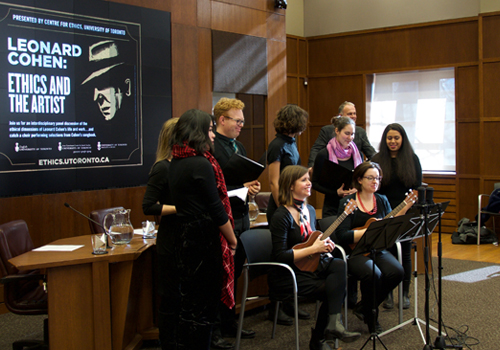Judging by latest public event hosted by the Centre for Ethics, Leonard Cohen, the recently deceased Canadian poet and songwriter, continues to draw a crowd.
A rendition of “Bird on the Wire” by Toronto youth choir VIVA! kicked off the event, followed by an interdisciplinary panel discussion.
George Elliott Clarke, U of T’s E.J. Pratt Professor of Canadian Literature and Canada’s Parliamentary Poet Laureate, got the audience’s immediate attention by framing Cohen in the context of the Beat poets of 1950s New York noting his use of the curse words so often peppered throughout Beat writings.
Cohen wanted to “free minds”
“Cohen wanted to free minds and followed the Beats in a denunciation of Puritanism and repression in North America,” Clarke said, noting that Cohen directed his own anger against the rigid Catholicism and moralism of Quebec at the time.

Norman Ravvin, a professor of Jewish studies at Concordia University in Montreal, discussed the prophetic strain that runs through many of Cohen’s works, noting that “prophets in Biblical times were no source of comfort; they were at odds with the communal status quo.”
Cohen’s “prophetic utterances,” Ravvin said, “were often softened by wit.”
Leonardo Augusto Zaibert, chair of the philosophy department at Union College in Schenectady, New York, told the packed room that upon coming to the United States in the early ‘90s, he was shocked to discover that most people he met referred to Cohen’s songs as “suicide music” or “depressing.”
A perceptive witness to the frailty of human interaction
“These reactions were based on superficial interpretations,” Zaibert said. “I think he had much more respect abroad. He was a perceptive witness to the frailty of human interactions, and he doesn’t shy away from heart-wrenching topics.”
The panel was asked if, in this age of daily profanities, curse words had lost their impact.
“It still holds shock value,” Clarke said. “It’s meant to be provocative. It’s part of a generational act of resistance to conformity. It’s an attempt to overthrow the idea that everyone should be conservative.”
When asked about Cohen and faith, Clarke maintained that “faith imbued Cohen’s work, and he tried to find a way of living with faith in a time God seems to have abandoned.
“An answer to the question ‘How do you write poetry after Auschwitz?’”

“I think he pulled from different faith traditions to cobble together a philosophy that allowed him to live in a secular age of apparent hopelessness and continuing atrocities. His whole career is an answer to the question “How do you write poetry after Auschwitz?”
Laura Menard, a U of T alumna who conducted VIVA! in a rendition of “So Long, Marianne,” also weighed in, noting that “Leonard Cohen raises many questions without solutions, which is enigmatic and refreshing in a world of easy answers.”
The February 9 event also included Cohen memorabilia from U of T’s Thomas Fisher Rare Book Library and miniature souvenir woodcuts of Cohen, printed on the spot by Toronto artist George Walker.
“Given Cohen’s recent death, I realized it could be a focal point for talking about him in an academic, public way,” said Markus Dubber, a professor of law and director of the Centre for Ethics.
The Ethics of Leonard Cohen was presented by the Centre for Ethics, the Anne Tanenbaum Centre for Jewish Studies, the Department of English and the Faculty of Music.

